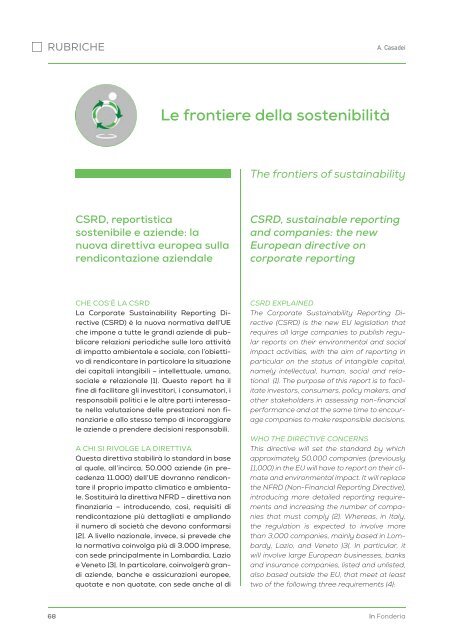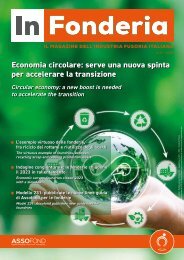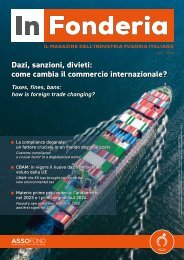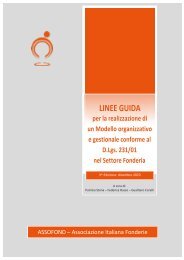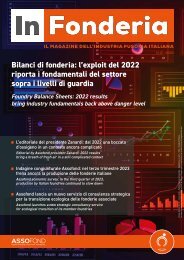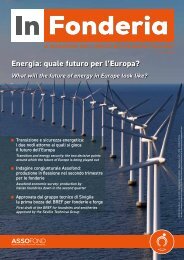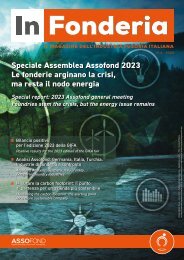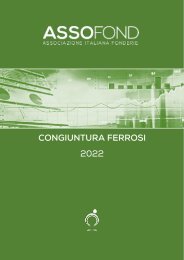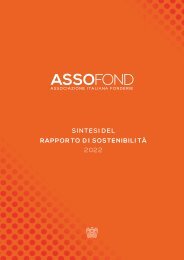In Fonderia 3 2023
Terzo numero del 2023 di In Fonderia
Terzo numero del 2023 di In Fonderia
Create successful ePaper yourself
Turn your PDF publications into a flip-book with our unique Google optimized e-Paper software.
RUBRICHE<br />
A. Casadei<br />
Le frontiere della sostenibilità<br />
The frontiers of sustainability<br />
CSRD, reportistica<br />
sostenibile e aziende: la<br />
nuova direttiva europea sulla<br />
rendicontazione aziendale<br />
CSRD, sustainable reporting<br />
and companies: the new<br />
European directive on<br />
corporate reporting<br />
CHE COS’È LA CSRD<br />
La Corporate Sustainability Reporting Directive<br />
(CSRD) è la nuova normativa dell’UE<br />
che impone a tutte le grandi aziende di pubblicare<br />
relazioni periodiche sulle loro attività<br />
di impatto ambientale e sociale, con l’obiettivo<br />
di rendicontare in particolare la situazione<br />
dei capitali intangibili – intellettuale, umano,<br />
sociale e relazionale |1|. Questo report ha il<br />
fine di facilitare gli investitori, i consumatori, i<br />
responsabili politici e le altre parti interessate<br />
nella valutazione delle prestazioni non finanziarie<br />
e allo stesso tempo di incoraggiare<br />
le aziende a prendere decisioni responsabili.<br />
A CHI SI RIVOLGE LA DIRETTIVA<br />
Questa direttiva stabilirà lo standard in base<br />
al quale, all’incirca, 50.000 aziende (in precedenza<br />
11.000) dell’UE dovranno rendicontare<br />
il proprio impatto climatico e ambientale.<br />
Sostituirà la direttiva NFRD – direttiva non<br />
finanziaria – introducendo, così, requisiti di<br />
rendicontazione più dettagliati e ampliando<br />
il numero di società che devono conformarsi<br />
|2|. A livello nazionale, invece, si prevede che<br />
la normativa coinvolga più di 3.000 imprese,<br />
con sede principalmente in Lombardia, Lazio<br />
e Veneto |3|. <strong>In</strong> particolare, coinvolgerà grandi<br />
aziende, banche e assicurazioni europee,<br />
quotate e non quotate, con sede anche al di<br />
CSRD EXPLAINED<br />
The Corporate Sustainability Reporting Directive<br />
(CSRD) is the new EU legislation that<br />
requires all large companies to publish regular<br />
reports on their environmental and social<br />
impact activities, with the aim of reporting in<br />
particular on the status of intangible capital,<br />
namely intellectual, human, social and relational<br />
|1|. The purpose of this report is to facilitate<br />
investors, consumers, policy makers, and<br />
other stakeholders in assessing non-financial<br />
performance and at the same time to encourage<br />
companies to make responsible decisions.<br />
WHO THE DIRECTIVE CONCERNS<br />
This directive will set the standard by which<br />
approximately 50,000 companies (previously<br />
11,000) in the EU will have to report on their climate<br />
and environmental impact. It will replace<br />
the NFRD (Non-Financial Reporting Directive),<br />
introducing more detailed reporting requirements<br />
and increasing the number of companies<br />
that must comply |2|. Whereas, in Italy,<br />
the regulation is expected to involve more<br />
than 3,000 companies, mainly based in Lombardy,<br />
Lazio, and Veneto |3|. <strong>In</strong> particular, it<br />
will involve large European businesses, banks<br />
and insurance companies, listed and unlisted,<br />
also based outside the EU, that meet at least<br />
two of the following three requirements |4|:<br />
68<br />
<strong>In</strong> <strong>Fonderia</strong>


